运用地理学的概念思维方式进行可持续发展教学
IF 3.1
Q2 EDUCATION & EDUCATIONAL RESEARCH
International Research in Geographical and Environmental Education
Pub Date : 2022-05-25
DOI:10.1080/10382046.2022.2079407
引用次数: 9
摘要
摘要本文探讨了地理学科思维方式如何使教师能够“组织深度地理学习”,使学生实现可持续发展。这些思维方式是基于主题的核心概念,本文选择的讨论方式是环境、互联和地点。论文认为,首先,地理学家思考生物物理环境与人类之间相互关系的方式将使学生对环境可持续性有深入的理解。其次,了解地理学家思考相互联系的方式,将使他们能够理解环境、经济和社会可持续性之间的联系,国家之间相互联系对其环境可持续性的影响,以及如何调查原因。第三,了解地理学家对地方的思考方式,将使他们能够了解可持续发展的理念如何在空间中变化,以及可持续发展的行动如何基于地方。应用地理学的概念思维方式将有助于学生理解可持续发展和地理学作为一门学科。本文章由计算机程序翻译,如有差异,请以英文原文为准。
Using geography’s conceptual ways of thinking to teach about sustainable development
Abstract This paper discusses how geography’s disciplinary ways of thinking can equip teachers “to organize deep geographical learning” about sustainable development in their students. These ways of thinking are based on the subject’s core concepts, and the ones selected for discussion in this paper are environment, interconnection and place. The paper argues, first, that knowledge of the ways that geographers think of the interrelationships between the biophysical environment and humans will give students a deep understanding of environmental sustainability. Second, knowledge of the ways that geographers think about interconnections will enable them to understand the links between environmental, economic and social sustainability, the effects of interconnections between countries on their environmental sustainability, and how to investigate causes. Third, knowledge of the ways that geographers think about place will enable them to understand how ideas about sustainable development vary across space, and how actions for sustainable development are place-based. Applying geography’s conceptual ways of thinking will contribute to both student understanding of sustainable development and geography as a discipline.
求助全文
通过发布文献求助,成功后即可免费获取论文全文。
去求助
来源期刊

International Research in Geographical and Environmental Education
EDUCATION & EDUCATIONAL RESEARCH-
CiteScore
5.20
自引率
33.30%
发文量
11
期刊介绍:
International Research in Geographical & Environmental Education publishes quality research studies within the context of geographical and environmental education. The journal endeavours to promote international interest and dissemination of research in the field, provides a forum for critique, and demonstrates the relevance of research studies to good professional practice.
 求助内容:
求助内容: 应助结果提醒方式:
应助结果提醒方式:


